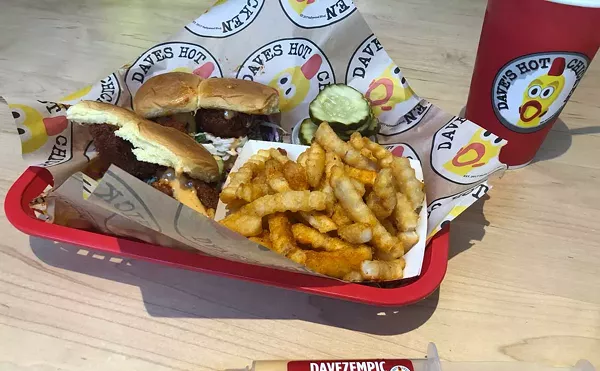
Audio By Carbonatix
[
{
"name": "GPT - Leaderboard - Inline - Content",
"component": "35519556",
"insertPoint": "5th",
"startingPoint": "3",
"requiredCountToDisplay": "3",
"maxInsertions": 100,
"adList": [
{
"adPreset": "LeaderboardInline"
}
]
}
]
When the voice at the other end of the line of a take-out restaurant informs you that you won't be able to pick up your order for at least 30 minutes, it suggests either hopeless inefficiency or that your food will be prepared from scratch. The latter is happily the case at Falaffel King, a seven-year-old establishment on Woodward Avenue south of 14 Mile Road in Royal Oak.
Syrian-born owner Ziad Atasi's take on Middle Eastern standards compares favorably with those found in many of his white-tablecloth, sit-down competitors. Not that you can't sit down in his plain, tiny storefront — he can accommodate 10 diners at the narrow counters along the walls and windows. But most of his patrons are happy to bring their food home where they can dine more leisurely and, of course, sip an adult beverage or two.
Falaffel King, which has won awards from the Detroit Free Press and the Oakland Press, earned the best suburban "cheap-eats" laurels in the 2004 Metro Times "Best Of" competition.
The restaurant's price structure, as befits a cheap-eats awardee, permits you to order expansively from all over the menu and thus bring home the equivalent of a full meal as well as an instant doggie bag. Sandwiches packed in foot-long wraps are $4.19. Hefty lunch entrées, which generally include hummus and fattoush salad and sometimes rice, are $6.95, and those same entrées, even in their still-heftier dinner size, come in below the $10 barrier at $9.95.
Of course, a restaurant does not win a cheap-eats award just because its fare is modestly priced. It also has to deliver on culinary quality, which Falaffel King clearly does with a traditional starter, a generously ladled serving of lentil soup ($2.25).
Lentil soup is to Middle Eastern restaurants as minestrone is to their Italian counterparts. Unless they come from a can, no two are ever completely alike, with wide variations in density and flavor even from the same stove from day to day. A hearty lentil, the only soup on Falaffel King's menu, was of pea-soup consistency and mildly peppery on two different occasions.
Most of the entrées also make an appearance on the wrap or sandwich roster. But if you order only the wrap, you will miss out on an especially perky fattoush salad. The bland hummus that comes with, however, is a bit disappointing. On the other hand, the garlic-infused tahini sauce, another common garnish, is anything but bland.
Chicken shawarma, which can be a bit dry if improperly prepared, is usually a good test of a Middle Eastern kitchen. Falaffel King's moist and tender bits of thigh easily pass muster. Equally satisfying are the char-broiled beef kebabs, although the marinated beef shish kebabs are more succulent. As with many lower-cost Mediterranean eateries, there is no lamb on the menu.
Thus the kibbee, a crunchy deep-fried football-shaped little delicacy, is stuffed with either beef or vegetables. The potato, onion and chickpea kibbee anchors a strong series of vegetarian options. At first glance, an unusual wrap that blends tabbouleh salad and baba ghanoush looks promising. The problem is that the smoky char-grilled eggplant overwhelms the gentler lemony tabbouleh. I would order them separately as appetizers to appreciate their dramatically different flavors and textures in isolation.
Majadra, one of the more exotic (for Westerners) dishes on the menu, is another vegetarian pleaser. This simple stew-like mélange of cracked wheat, lentils and onions, enlivened with cool yogurt, is pure comfort food and preferable to the variation that substitutes rice for the bulgur.
So why is the restaurant called Falaffel King? I've hesitated to this point to bring up its rendition of Falaffel's titular dish because I found it underwhelming. The little patties, composed of chickpeas, garlic, onion and "secret" spices, struck me as dry and underseasoned. Moreover (and this is nitpicking), the promised pickled turnips, which come along with the lettuce and tomatoes, were few and far between. Needless to say, I am aware that some readers will be quite content to do without the much-maligned turnips.
Falafel lovers can order the patties either with hummus or baba ghanoush, while a new entrée, falafel tanour, is accompanied by tomatoes, fattoush and fries.
Among the highlights from the rest of the menu are admirable grape leaves, chicken kebab, beef shawarma and pies stuffed with spinach, spinach and cheese, or beef. In addition, Falaffel King offers unadventurous children — and maybe even adults — hamburgers wrapped in pita with fries, chicken wings, chicken fingers with ranch dressing and grilled-cheese sandwiches.
Dessert is something of an afterthought, although you might get lucky and hit the restaurant when two Syrian pastries, namura, a sort of brownie, or mamool, a butter cookie, are available along with the more familiar baklava and rice pudding.
Even without dessert, a meal at Falaffel King can be a treat. To be sure, its homely setting is far from regal. Nonetheless, it continues to rule in that vast domain of "cheap eats."
Mel Small teaches history at Wayne State University. Send comments to letters@metrotimes.com.





